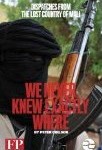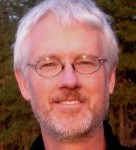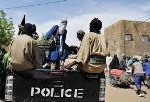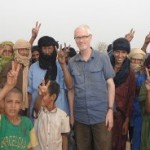Review of Peter Chilson (Niger 1985-87) We Never Knew Exactly Where: Dispatches from the Lost Country of Mali
 We Never Knew Exactly Where:
We Never Knew Exactly Where:
Dispatches from the Lost Country of Mali
By Peter Chilson (Niger 1985-87)
FP Group, $499
2013
Reviewed by Robert E. Hamilton (Ethiopia 1965-67)
Edited by Susan B. Glasser with assistance from Margaret Slattery, Foreign Policy (the FP Group) and the Pulitzer Center on Crisis Reporting have launched a Borderlands project in which they will commission “leading writers to travel several of the world’s most impenetrable fault lines, the global gray zones where countries and people-and our own flawed ideas about them-meet.” Peter Chilson’s eBook is the first in this series to be released. It provides useful background as a travelogue although it is not, as Glasser claims, “a definitive account” of what has happened in Mali since the military coup of March 2012. The book does represent the Mali crisis from the coup in March right up until January 10 (two days after the book came out), which is when jihadist rebels began their push south in the attack that provoked the French air strikes and the insertion of 2,500 French troops. Therefore, it does help us understand the current breaking news about conflicts in Mali as well as in Algeria.
Chilson draws upon the works of earlier travelers to the sahel (Arabic: skirt, border) as well as his own experience there since 1985. He refers to his archival research in Mali and he cites, without actually footnoting, travelers’ accounts but this reviewer would not describe it as a “scholarly work.” Aside from footnotes, it lacks a bibliography and includes only one map, one useful in showing the approximate boundary separating northern Mali, referred to as “Azawad” by Tuareg nationalist rebels, and the south, as well as the location of major cities (e.g. the capital Bamako and Mopti south of the boundary, and Timbuktu and Gao north of it). But the map lacks other sites essential to Chilson’s narrative, such as the Niger River, Douentza, Bandiagara, Koro, Zegoua, and Nielle.
So much, for the moment, about what the book is not. There remains much to praise in this book, enough so that I can only touch upon selective components. The intriguing title, We Never Knew Exactly Where, refers to Peter Chilson’s accompanying his guide, Isaac Sagara (to whom the book is rightfully dedicated as his judgments may have saved Chilson’s life in various potentially dangerous circumstances), on a previous trip during which their actual geographical location was frequently unclear to Chilson. The title also artfully refers to one of the major themes of the book: How and why were West Africa’s historical boundaries of empire and nation-state borders determined, what do they mean to ordinary citizens and residents today, and why do people and countries accept them today as sacrosanct or ignore them when it is convenient or necessary for survival? Chilson does a skillful job in trying to persuade his subjects–residents of the sahel, savannah, and forests, rural and urban–to discuss the meaning of the region’s history and empire builders such as “Soundiata Keita” who founded the first empire of Mali and who is described by one historical praise singer in D. T. Niane’s translation, An Epic of Old Mali.
A second important focus of investigation is the transformation of Mali since the March 2012 military coup from a stable democratic nation with an elected President, Amadou Toumani Touré, now living in Senegal, to a country at war with itself. Chilson quickly alerts his readers to Mali’s diversity: The sahel is an ecological zone of transition between the Sahara dessert and the savannah. Chilson notes that it is a place of many “divides”: “Tribal zones, too, complicate the land, along with European-made borders. And other divides: North versus south. Women against men. Farmer against herder. Dozens of distinct languages: Arabic from Dioula, Dogon from Fula. And separate faiths: Muslim, Christian, Animist. Sufi Muslims and Salafi Muslims. Mystics and jihadists.”
In Chapter 1, “Limboland,” Peter Chilson (Bouza,Niger: 1985-87) leaves Bamako with Isaac Sagara by bus for Mopti and Sagara’s Toyota Land Cruiser and the next stage of their travels: to visit Sagara’s family and others in Koro and the Dogon country of the Bandiagara Plateau. Historian Cherif Keita, a professor at Carleton College, observed to Chilson that Mali’s democratic image was “an empty shell.” The collapse and division of the country into an Islamic jihadist state in the north, linked to al Qaeda, and the failed democracy of the south threatens the security of West Africa, expatriates of various continents, and international business and manufacturing interests. The deceased former president of Libya, Muammar al Qadddafi, supported the Tuareg who then supported him and returned with armored vehicles, weapons, and ammunition to support the nationalists (of the National Movement for the Liberation of the Azawad, known by its French acronym, MNLA) as well as al Qaeda Islamist jihadists in Northern Mali.
Qaddafi wanted Tuareg support in seizing mineral resources in Chad and Niger and employed 10,000 Tuareg towards that end. The Tuareg, who number about 7 million people, half of them in Mali and Niger, have wanted to establish their own nation-state since before the French left in 1960 and recognized eight countries which had been part of their French colonial empire in West Africa. Niger disarmed the Tuareg who returned from Libya but Mali did not. The military coup in Mali of March 2012 provided an opportunity for the heavily armed Tuareg to establish control of northern Mali and declare it to be Azawad, which Chilson calls a “statelet.” “Azawad,” according to Chilson, “was simply the Tuareg term for a geographic region that began as a flood basin of the Niger River some 3,000 years ago, covering 34,000 square miles immediately north of Timbuktu and the Niger River and now not much more than a desert frequented only by nomadic herders. In Tamashek, the Tuareg language, Azawad today is the word for “pasture,” reflecting the nomadic nature of Tuareg culture. But it has a political connotation too, since the 1958 formation of a pre-independence Tuareg political party, Mouvement Populaire de l’Azawad, founded in northern Mali by Tuareg intellectuals.”
The Malian army estimates there are 3,000 armed Tuareg in Northern Mali who share the outrage of other “minorities” living in two or three contiguous countries that they have been the subject of conscious discrimination for decades by “southerners” and “the government,” a situation which is also described in the second chapter, which focuses upon the Ivory Coast.
The al Qaeda-Tuareg alliance quickly fell apart as the former’s goal was that of an Islamic state based upon sharia, law derived from the Koran and the hadith (collected traditions, teachings, and stories of the prophet Muhammad used as the basis of Islamic doctrine and the judicial system). Tuareg nationalists want their own state but one with a secular character that respects all of Mali’s religious traditions and institutions. The al Qaeda jihadists captured Timbuktu and Gao and territory as far south as Douentza and destroyed shrines and monuments sacred to the Sufi but which the jihadists viewed as icons and symbols competing with a purer form of Islam.
The reader can conclude at this point that the Tuareg goal of a separate state is understandable. Despite intrepid investigation in a war zone, Chilson’s story is short of certain facts: Who exactly are the Tuareg leaders? What is the structure of Tuareg leadership, and how organizationally and geographically comprehensive is it? The book is long on historical context but this reader certainly wanted to know more about what Chilson learned of the current Tuareg nationalist leadership. Had it issued position statements, press releases, established a unified and functional government as well as schools and clinics?
Interestingly, the Malian military commander of the northern army, Col. Didier Dacko, told Chilson that the MNLA and al Qaeda represented a national threat to the historical city of Timbuktu that the military government could not abide. Although Dacko is a Bobo and his people live southeast of Mopti, far removed from Timbuktu and its 700,000 historical documents as well as its mosques and shines, Col. Dacko stated that Mali could not exist without Timbuktu as a spiritual and cultural treasure. The appeal to mysticism was echoed by the Malian artist Baba Wague Diakite who told Chilson that while the tourist may find international boundaries and visas and checkpoints a hassle, the spiritual adventurer does not even recognize boundaries. Or, as one Malian cattle herder put it, in more practical terms, “We go where the grass is.”
Chilson himself recalls visiting Timbuktu the first time in 1986, from Niger where he was a Peace Corps Volunteer teacher. The city had one full hotel and it was an arduous journey by a Peugeot 504 taxi to even get to fabled Timbuktu where he was forced to sleep on the concrete porch of what he later determined was a bordello.
“Still,” he writes, “I found the city and the desert beyond to be one of the most beautiful and haunting landscapes I’ve ever seen. At night, the desert sky was so bright, the stars so clear, that it all seemed to rest right on the rooftops. During the day, the city and landscape blended into the blinding pale sky as if Timbuktu itself were floating on a cloud. I loved how the wind continuously rubbed the tops of dunes, blurring them into the horizon and forming ridges that looked as if they had been pressed by a giant thumb and forefinger.
It is part of the reason why I keep going back to the Sahel and the southern Sahara-the land is so big and so extreme. The other reason, and maybe it’s not all that surprising, is that the people who live there are so resilient.
Perhaps that is because they have much to be proud of. Mali draws its history from a millennium of ebbing and flowing empire.”
The Tuareg MNLA started the rebellion and their advance stopped at Douentza, 90 miles north of Mopti. Soldiers had fled Douentza without firing a shot, and rebels pulled into the town on the night of April 5, 2012, in a half dozen heavily armed pickup trucks.
The next day the MNLA announced the end of its campaign and declared Douentza the “frontier” of their new nation, Azawad. According to testimonies from refugees who arrived in Mopti later, the rebels drove around Douentza firing guns in the air and raiding homes and shops for cars, appliances, tools, and money.
Col. Dacko (age 50) described himself as a military man not interested in politics. He attended the National Defense University in Washington, D.C. and wrote his thesis on the security problems of northern Mali. His army had retreated from Douentza, a source of embarrassment. Dacko refused to discuss it or the political situation in Bamako and the junta’s position that they were capable of providing security for Mali without outside assistance. Yet Dacko had few soldiers on hand and was waiting for reinforcements before trying to re-take Douentza. Dacko did admit that the presence of an armed and well-financed al Qaeda of the Islamic Maghreb significantly complicated the task of the Mali government reasserting its control and authority in Douentza, Timbuktu, Gao, and the region father north. (In a National Public Radio segment of “Morning Edition” on January 25, 2013, Brookings Institution analyst Bruce Riedel reported that al Qaeda of the Islamic Maghreb had approximately $200 million in cash as a result of its smuggling and kidnapping/ransom operations.) Dacko also asserted that, “from a military point of view, let there be no question: We are confident of our abilities, and we are going to invade and take back the north… the north is Mali.” Chilson remained unconvinced.
It was surprising that Chilson, however, did not ask more direct questions about the details of Dacko’s information about either the Tuareg MNLA or al Qaeda or their respective command structures and operations.
Preparing for a four-day, potentially dangerous Land Cruiser trip to Bandiagara and Koro, Chilson notes that his only previous trip involving this level of risk was in 2006 and then again in 2011 to northern Ivory Coast. So, reader, while preparing for the Bandiagara trip, Peter Colson shares his war-zone mission to Zegoua and Nielle.
In Chapter 2, “A Border Between Peace and War,” Chilson chronicles his efforts in 2006 to locate and interview Commandant Ousmane Coulibaly, one of the key figures in the rebel New Forces army of northern Ivory Coast, the army which challenged President Laurent Gbagbo when he refused to step down following the election results of 2002. This chapter is a further elaboration on the themes of international borders; civil war and Northerners versus Southerners; personal safety and the vulnerability of the unarmed general population as well as the coping mechanisms they use during civil strife and violence; the corrupt ways in which military officers and elected and appointed officials cooperate to fleece merchants, transporters, and the citizenry; dissatisfaction in the ranks of the army when they go unpaid while their superiors enhance their own bank accounts; and other subjects. It does not directly relate to the northern Mali issues of Chapter 1 but Chilson does give us a vivid picture of daily life and how people work to sustain themselves through good times and bad in a land of heat, drought, and war.
In the third and final chapter, “In the Dogon Country: From Tourist Haven to the Border of a Jihadist State,” Chilson is on the road again in May 2012 with guide and driver Isaac Sagara. “Rumors flew,” Chilson writes, “that raiders from Douentza, 90 minutes north of the city of Mopti, were hitting villages on the sandy plain below the Bandiagara cliffs east of Mopti. Across the Bandiagara Plateau, home of the Dogon people, where north and south meet along Mali’s new political frontier, government crumbled. Schools and medical clinics closed as staff fled a feared rebel advance. Police stations shut down, leaving only the green, yellow, and red Malian flag flying above abandoned posts.” Yet the Dogon leaders and people were convinced that the cliffs protected them and that the rebels or al Qaeda would have to defeat Mopti to reach Bandiagara, a city of 12,000 people. After Timbuktu, this is the second most popular tourist site in Mali and it has lost considerable revenue because of the war.
“In March and April, on the back of the Tuareg rebellion, a whole new set of jihadist groups-including al Qaeda in the Islamic Maghreb, Ansar Dine [Defenders of the Faith], and the Movement for Unity and Jihad in West Africa-had arrived at the edges of Isaac’s Dogon homeland, having chased the Tuareg nationalists underground and its leaders into exile in Niger and Burkina Faso.”
Chilson’s goal was to meet the Tuareg prefect (“sub-regional governor”) in Koro, Isaac’s family’s home site. The Tuareg rebels visited Koro on April 6 and were angered to find a World Vision Bible there. The governor, Intalamt Ag Air Zaye, a former high school history teacher who was born in northeastern Mali near the border with Niger, was part of the government team which unsuccessfully negotiated with the Tuareg in November 2011. Isaac, however, does not trust him or the Tuareg generally and describes the Tuareg as “thieves and slave traders.” The governor might betray Chilson and Isaac’s family to the rebels. President Toure (prior to the military coup of March) trusted Air Zaye. Souleyman Drabo of the government news service in Bamako told Chilson that Zaye had a solid reputation. But Isaac was not convinced. This was the first serious disagreement Chilson had with Isaac.
Chilson has visited Bandiagara a dozen times during the past 25 years, and soldiers always kept a low-profile: they were farmers in uniform and were less threatening than soldiers in other African countries. Now the army was more evident, with cannons mounted on armored vehicles. There were a lot of soldiers on the streets. There were no tourists, the hotels were all closed; government, business, and nonprofit agency offices were devoid of signs in order to avoid drawing the attention of rebel Tuareg. Schools were closed. The people of Bandiagara were edgy, fearful of a sustained attack the army could not handle. People were suspicious of Chilson, correct in not believing he was a tourist, his cover story.
On April 6, six “rebel fighters” had entered Koro in a Land Cruiser pickup with a partially deflated tire. They broke into the office of the gendarmerie looking unsuccessfully for weapons. At the market they seized a young man who showed them the office of World Vision, whose staff had fled. There they stole two motorcycles and spare tires. The 4,000 Koro Christians were alarmed when the rebels found a Bible. The rebels threatened to kill the World Vision watchman if he did not reveal who owned the Bible, but he said he was a Muslim and prepared to die if God willed it. The rebels threw the Bible in the dirt and drove away without firing a shot.
Koro mayor Soumaila Djinde and the Tuareg governor, Air Zaye, called the army in Mopti and Bandiagara. On April 8, two Toyota pickup trucks with mounted weapons and soldiers arrived, but they only stayed the night and left. Djinde said this proves that Koro cannot expect protection from the army, only from God.
Also on April 6, rebels entered a village on its market day, stole a truck and killed a merchant. The army arrived a day later-again demonstrating the lack of protection for villages and towns or small cities. The Koro police force had fled; there were no troops between Koro and Douentza.
Djinde said that he trusts Air Zaye but also noted that the rebels did not visit his office on April 6. Air Zaye might be a spy or not. Regardless, Djinde, as mayor, had to work with him. Also, Djinde was born in Koro and so would not leave. Bamako has forgotten Koro and looks only to protect itself.
Chilson and Isaac met Air Zaye (age 57) on May 11 at 8 a.m. without an appointment, without time for him to inform the rebels if, indeed, he was a spy and informant. “An independent Azawad is impossible,” Air Zaye maintained. Buy Chilson’s book and read the entire interview he conducts with this Tuareg governor and government official whose true loyalties are questioned by many for whom he is responsible. Imagine living in a place devoid of protection from armed and violent young men who may act ruthlessly and with impunity.
Peter Chilson displayed extraordinary courage in undertaking his research for this book, a timely short one of 88 pages which portrays a region still coping with the consequences of French colonial rule and a bubbling “nation-building” stew on the sahel stove. At its establishment in 1963, the Organization of African Unity, headquartered in Addis Ababa, Ethiopia, adopted the policy of accepting the international boundaries inherited from their colonial past, a fact not mentioned by Peter Chilson but certainly relevant to his research and the interviews he conducted. The OAU policy was certainly tested during the period 1967-70 when Eastern Nigeria declared itself to be “Biafra” and independent of Nigeria itself. However, once one starts altering the boundaries of the 54 African states, including the eight which were part of l’Afrique occidentale francaise, the AOF, or French West Africa, where can or should the present African Union stop?
Chilson was also wise to pu t himself into the hands of guide and driver Isaac Sagara. We readers are relieved to learn that the border region was quiet when they left Koro for another boundary, allowing Isaac to return safely to Koro and Chilson to get his exit visa stamped and to proceed to Malian refugee camps in Burkina Faso. One suspects we shall meet them again soon on a dusty sahelian road or sharing grilled goat with rice and sauce en route to yet another interview. Au revoir.
t himself into the hands of guide and driver Isaac Sagara. We readers are relieved to learn that the border region was quiet when they left Koro for another boundary, allowing Isaac to return safely to Koro and Chilson to get his exit visa stamped and to proceed to Malian refugee camps in Burkina Faso. One suspects we shall meet them again soon on a dusty sahelian road or sharing grilled goat with rice and sauce en route to yet another interview. Au revoir.
Robert E. Hamilton (Ethiopia 1965-67) consults to medical and educational programs in Africa from Portland, Oregon. He recently published his debut novel on Kindle eBooks: Dr. Dark.
The book can also be bought for Kindle from Amazon.com: http://www.amazon.com/Never-Knew-Exactly-Where-ebook/dp/B00AYO3GFI/ref=sr_1_1?ie=UTF8&qid=1359169756&sr=8-1&keywords=Peter+CHilson
In reviewing Peter Chilson’s book, I refer to the “intriguing title” but ascribed it incorrectly to Chilson being unsure of “exactly where” he was during a trip with guide Isaac Sagara. While true, the title actually derives from a quotation by Lord Salisbury: “We have been engaged in drawing lines upon maps where
no white man’s foot ever trod; we have been giving away
mountains and rivers and lakes to each other, only hindered
by the small impediment that we never knew exactly where
the mountains and rivers and lakes were.”
—Lord Salisbury, British prime minister,
on Europe’s scramble for Africa, 1890
My apologies to Peter Chilson and I thank him for pointing out my misunderstanding.